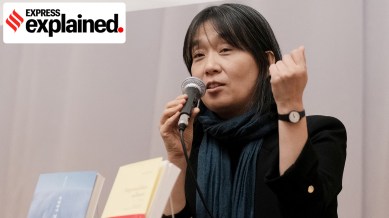Literature Nobel for Han Kang: Empathetic explorer of historical trauma and personal loss
If The Vegetarian marked Han’s ascendancy in the Anglophone sphere, then the Nobel Prize in Literature, awarded on October 10, conferred global recognition. Here is what makes her works stand out.

In 2016, Han Kang’s The Vegetarian became the first Korean language novel to win the Man Booker International Prize. A deeply ruminative book about the consequences of quiet but absolute resistance, The Vegetarian focuses on housewife Yeong-Hye and her decision to stop eating meat. Colonialism, patriarchy, violence and meat eating become intimately entangled as various family members — Yeong Hye’s controlling husband, her obsessive brother-in-law, and her overwhelmed sister — respond to Yeong-Hye’s vegetarianism and her growing desire to become a plant.
If The Vegetarian marked Han’s ascendancy in the Anglophone sphere, then the Nobel Prize in Literature, awarded on October 10, conferred global recognition to her entire body of work. Han is also the first South Korean Literature laureate. In a press release announcing the award, the Royal Swedish Academy lauded Han “for her intense poetic prose that confronts historical traumas and exposes the fragility of human life”.
monthly limit of free stories.
with an Express account.
Han was born in Gwangju in 1970 to a literary family. Her father is a celebrated novelist, and both her brothers are writers. In 1980 the family moved to Seoul and Han went on to study Korean Literature at Yonsei University. Though Han has been publishing since 1993, The Vegetarian — first published in 2007 — was her first novel to be translated into English.
Han’s writing constitutes a diverse body of work
Human Acts (2014) explores the Gwangju massacre of 1980, when peaceful student demonstrations were violently suppressed by the Korean military. The White Book (2017) utilises visceral imagery and a fragmented structure to ponder the death of the narrator’s newborn sister. In Greek Lessons (translated into English in 2023), a woman who has lost the ability to speak learns ancient Greek from a teacher who is slowly losing his vision. We Do Not Part (2025) recovers and reframes the history of the Jeju massacre through the lens of female relationships.
Yet, certain themes recur throughout Han’s writing. Her novels focus on the subjective and personal experiences that arise from contexts of trauma, brutality and loss.
Yeong-Hye’s vegetarianism is a response to the violent physicality of her world. In one scene her father, a veteran of the Vietnam War, reads her dietary choice as a challenge to the patriarchal control that he represents. Han has explained that she wrote the novel to ask if it was “possible for humans to live a perfectly innocent life in [a] violent world”.
Human Acts meditates on the murder of 15-year-old Dong-ho by focusing each chapter on a different person impacted by his short life. Han frequently uses second person narration to immerse readers in the bleak and disoriented lives of her characters.
We Do Not Part anchors its exploration of historical trauma to the intertwined lives of three women, Kyungha, Inseon, and Inseon’s late mother. Inseon’s mother is traumatised by her memories of the Jeju massacre, and the novel unfolds how these experiences shape her relationship with her daughter. Across her work, Han depicts the intimacy and minutiae of human life in the wake of trauma.
Han is also a biographer of women’s experiences
The White Book examines the poetry of life and death that surrounds pregnancy and childbirth. In gorgeous, evocative prose, Han explores the unsettling dimensions of mourning a sister whom the narrator never knew.
Han’s women are quietly stubborn, they exert their questioning and agency in ways that might not register within western feminism. They tend to trouble patriarchal structures through acts of negation and withdrawal. In Greek Lessons, the unnamed narrator doesn’t “like taking up space” and has “no wish to disseminate herself”. In
The Vegetarian, Yeong-Hye decides to separate herself from meat and eventually humanity, a choice that is met with violent reprisals from her husband, father, and brother-in-law.
The author is a PhD candidate in English at Fordham University, New York. She works on postcolonial South Asia.